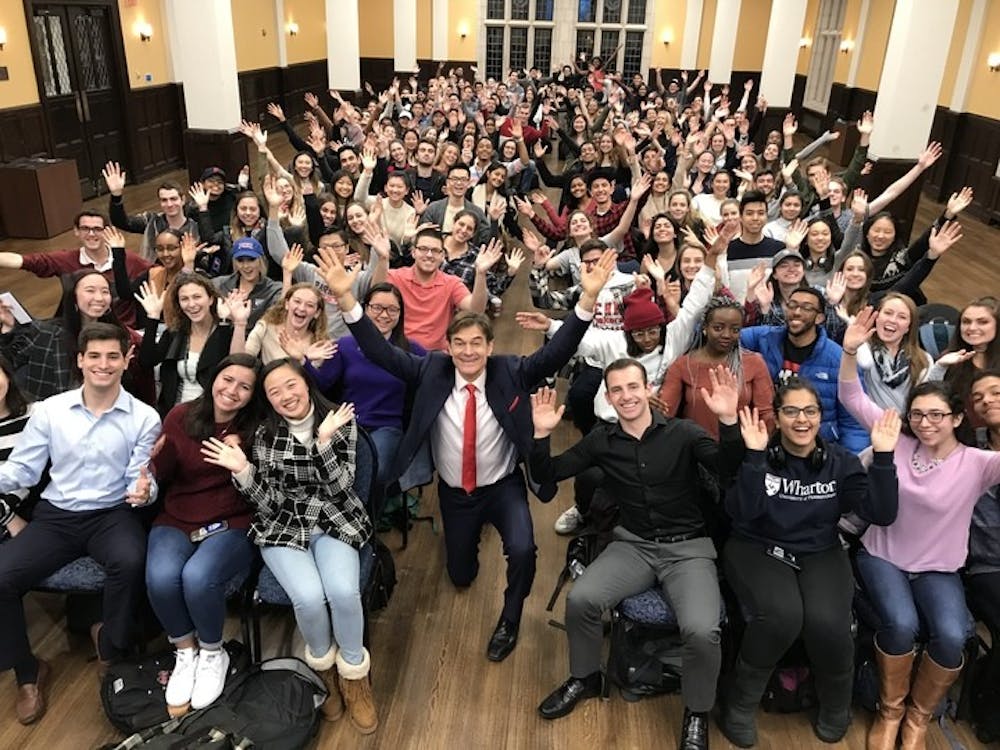Mehmet Oz, the Turkish-American cardiothoracic surgeon known for his television appearances on "The Oprah Winfrey Show" and his own talk show, "The Dr. Oz Show," paid Penn students a visit on Nov. 13. The 1986 Wharton graduate, who has been criticized by other doctors for having a passion for financial returns over the scientific practice of medicine, said he was glad he came to a campus that valued both.
Dr. Oz spoke to more than 200 Penn students in Houston Hall about how to achieve wellness in one’s life. The presentation, entitled "The Good Life: What You Really Want," was open to students from all schools and organized by Wharton Wellness and the Wharton Council.
Dr. Oz received his M.D. and MBA at Penn before entering medicine and entertainment. He performs cardiac operations on Thursdays at the New York-Presbyterian/Columbia University Medical Center, but also hosts "The Dr. Oz Show" and publishes a bi-monthly magazine called "The Good Life."
Dr. Oz has received frequent criticism from fellow doctors for his “promotion of fraud and quackery.” For some students, the controversy surrounding Dr. Oz's practice made this speaker event more compelling.
“I recently saw this video of him giving a testimony in front of the federal government about multivitamins,” said College and Wharton senior Anita Wang. She went on to add that John Oliver did his own show about the illegitimacy of Dr. Oz's promotions. “I think he is a controversial person and I wanted to see if anyone asked him about it.”
Just prior to the question and answer session, Dr. Oz addressed some of the controversy surrounding him in the media.
“I don’t know how many of you Googled me recently, but you’re going to see me selling all kinds of weight loss supplements and facial creams. They are all fake,” said Dr. Oz. “Fake ads are the first step towards fake news. And fake news is all about money."
RELATED:
Doctors call for removal of Penn graduate Dr. Oz from Columbia faculty
Practicing yoga regularly can improve mental wellness — but cost can be a problem
From tackling eating disorders to overcoming isolation — a look into new Penn Wellness initiatives
Some other students were not as familiar with the specifics of the medical controversies surrounding Dr. Oz, but were still familiar with his name.
“I don’t know that much about Dr. Oz other than his general reputation, and I just thought it would be an interesting experience to see him live,” College senior Claire Lisker said.
Organizers of the event from the Wharton Wellness Board said Dr. Oz was chosen as a speaker because of his relations to Penn and his range of experiences.
“With the new Wellness Board at Wharton, we thought it was a good opportunity to collaborate and bring a speaker in who . . . was an [alumnus] and could talk about his professional path,” said Wharton senior and Council member Emily Goldman. She added the collaboration also attempted to incorporate the "student wellness lifestyle."
In his talk, Dr. Oz jumped between a variety of topics, from time and energy management to the intricacies of cardiac surgery. But the overarching theme of his talk was how to achieve wellness, both mentally and physically.
“On the show, this is the number one problem I cope with: the fact that people feel stressed out and use tools to cope that are maladaptive,” Dr. Oz said.
Dr. Oz stressed that wellness begins at home, and part of the reason he left the operating room full time was because he was tired of operating on conditions that could’ve been prevented months before. This was also why he chose to educate the general population about ways to improve wellness, and encouraged students in the audience to do the same.
“Evil is not when bad people do bad things,” said Dr. Oz. “Evil is when good people watch bad people do bad things and don’t do anything about it.”
Dr. Oz concluded the presentation by celebrating Penn’s interdisciplinary approach to learning, which allowed him to study not only the medical aspects of his field, but the monetary side as well.
“I realized that I loved, loved, loved medicine, and I wanted to practice it my whole life, but I didn’t want to work for someone else. And I knew that medicine was being taken over by money,” Dr. Oz said. “But, I also realized that money was important in health care if you did it right. So I came to a campus that was truly integrated in every way.”



